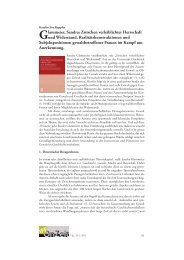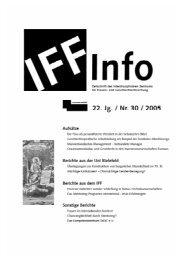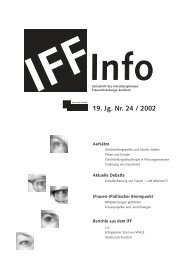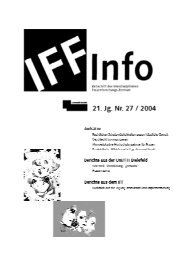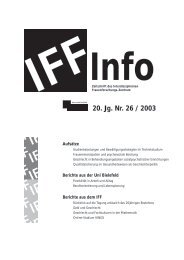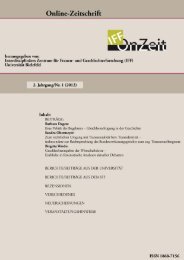IFFOnZeit Nr.1, 2009
IFFOnZeit Nr.1, 2009
IFFOnZeit Nr.1, 2009
Erfolgreiche ePaper selbst erstellen
Machen Sie aus Ihren PDF Publikationen ein blätterbares Flipbook mit unserer einzigartigen Google optimierten e-Paper Software.
Rezensionen<br />
articles in the anthology attend to a critical discussion about the role of national funding<br />
agencies within gender equality policies. Maya Widmer (Swiss National Science Foundation,<br />
Switzerland), Regula Julia Leemann (Pedagogical University of Zurich, Switzerland),<br />
Heidi Stutz (Centre for Labour and Social Policy Studies, Bern, Switzerland) and<br />
Kathrin Schönfisch (Swiss Federal Statistical Office, Switzerland) present in their paper<br />
“Cooling out? Gender and Research in Switzerland” first results from a study concerning<br />
possible reasons for the low proportion of women among applicants for research grants at<br />
the Swiss National Science Foundation (SNSF), which is the largest institution promoting<br />
research in Switzerland. One of their main questions is, whether the small pool of female<br />
applicants reflects existing university structures or whether it is due to the particular<br />
mechanisms and politics of research advancement. Their results suggest that 1. women are<br />
already underrepresented among the applicants of research funding, 2. if women submit<br />
applications, they are just as successful as men and 3. for both genders, there is a clear<br />
effect of children on the first funding application to the SNSF. Wanda Ward (National<br />
Science Foundation NSF, US) describes in her paper “The Success of Female Scientists in<br />
the 21 st Century” the gender equality policies of NSF, especially in science and engineering,<br />
and introduces the Foundation’s ADVANCE programme. ADVANCE subsidizes<br />
new programmes aimed not on individual promotion but on institutional transformation<br />
of universities instead.<br />
Evaluations of gender equality programmes are becoming an increasingly important<br />
topic: on the one hand to ensure quality in gender equality policies and on the other<br />
hand to support the actors of gender equality policies in political processes and political<br />
decisions within universities. Nevertheless in Germany but also in other German-speaking<br />
countries there are very few independent evaluations of gender equality programmes<br />
or of institutions for the advancement of women. In their paper “Evaluation of Gender<br />
Equality Policies” Andrea Löther (CEWS, Bonn, Germany) and Elisabeth Maurer (University<br />
of Zurich, Switzerland) use their experiences as evaluators and evaluatees to provide<br />
an analysis of the context and the preconditions of evaluations in the area of gender<br />
equality policies in higher education. The authors show that “the process of evaluating<br />
gender policies in higher education is embedded in a contradictory context of interests<br />
and conflicts, of ensuring quality and allocating resources” (p. 54). At the end of their<br />
paper the authors consider conditions based on their critical reflections and their own experiences.<br />
These relate to gender sensitive evaluations as well as important standards and<br />
frameworks for evaluations of gender equality programmes in scientific fields and institutions<br />
aimed at the advancement of women. Terry Morehead Dworkin (Indiana University,<br />
US), Angel Kwolek-Folland (University of Florida, US), Virginia Maurer (University<br />
of Florida, US) and Cindy A. Schipani (University of Michigan, US) introduce in their<br />
paper “Pathways to Success for Women Scientists in Higher Education in the US” successful<br />
programmes for the increase of the percentage of women in the STEM (science,<br />
technology, engineering, and mathematics) fields. First of all the authors describe – based<br />
on comparative data from the US – the actuality of the well known “leaky pipeline” for<br />
women in STEM. Subsequently they outline general recommandations and examples of<br />
best practices initialized by the NAS (National Academy of Sciences, US) and the NSF<br />
(National Science Foundation, US) to overcome gender disparity in STEM. Finally the<br />
authors report on their experiences and the conditions of implementations of successful<br />
promotion programmes for women in STEM at their universities, programmes which<br />
could be supportive at any institutions or universities.<br />
1. Jg., Nr. 1, <strong>2009</strong><br />
149



